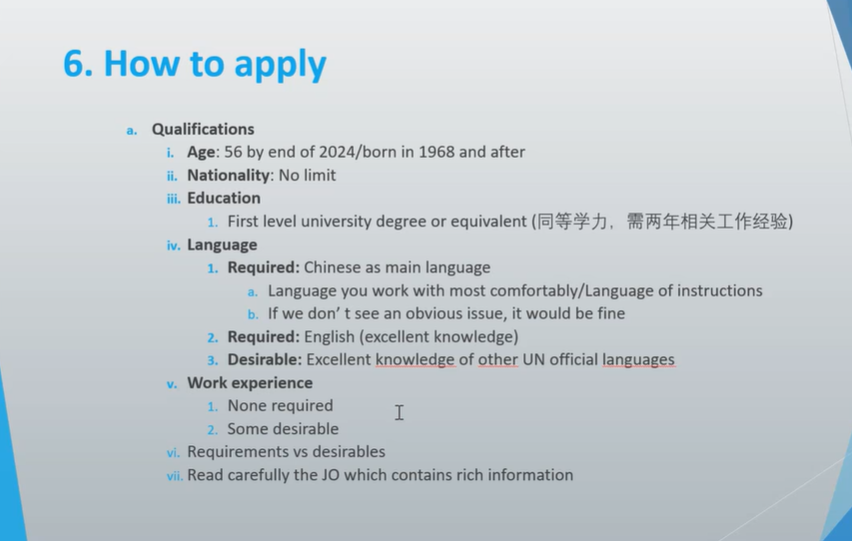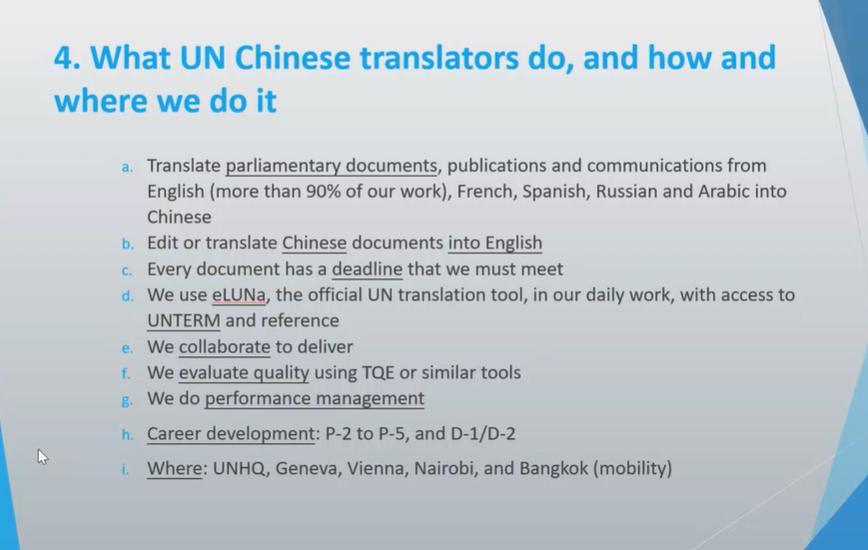According to consistent media reports, Americans don’t want to go to China to study, or to do work. In the entire country, there are maybe only a few hundred are studying in China, down from 11,000 in decades past. Both the Chinese and American governments think this is a serious problem and theories swirl about why this is happening. On the ground, the situation is a whole lot clearer: young Americans choose study based on job prospects, and with few exceptions Americans (and other foreigners) are banned from most of the good China-related jobs.
In this article, I will discuss explicit rules that say American-born China experts cannot be considered as job candidates for positions in organizations spanning the United Nations, corporations, American law firms, and Chinese universities. We’ll look at photographs of official United Nations documents that in bureaucratic language say you cannot hire an American for these roles even if they are qualified. We’ll look at case studies of real people who found out the hard way.
As indicated in a previous article here, while China does promote learning of Chinese and China study to Americans, high-paying China related jobs have been promised to Chinese people, therefore institutions will attempt to steer you into being a poorly qualified English teacher with some knowledge of China making maybe $14,000/year. Even famous China author Peter Hessler was recently strong armed into being an English teacher on a $14k year salary then punished for not conforming to those expectations. At the same time, China-born “America experts” in China were making 100 times as much– $1.4 million a year. While the whole truth isn’t easily visible to prospective students, they can see very clearly the lack of success stories here.
There is lots of needless debate about why Americans stopped coming to China. The more obvious answer is talented young Americans who could become doctors and lawyers, are not going to spend 10 years of their lives so they can get sucked into being victims of a modern day version of the Jim Crow Laws and forced to work for what they could get flipping burgers at McDonald’s.
What Happened: Disappointed Expectations Caused Backlash
If you study the media and look at what people said over the past 40 years about Americans (or other foreigners) going to China and learning Mandarin Chinese, you see that bold faced lies were being told to the first generation of foreigners to China. As a result, they felt betrayed and developed strong anger against China.
They turned against the country and began aggressively negatively reporting against China in order to expose the “big lie.” A key example of this is Trump advisor Michael Pillsbury, who advocated launching the trade wars against China, who wrote a whole book about the “big lie.” More clear cut examples are publications like the China Law Blog and the YouTube channel by Winston Sterzel.
Underneath the surface, the “big lie” was simply an everyday propaganda campaign, and academics say Americans believed in these campaigns because they wanted to, out of wishful thinking. Since China started economic reforms, it promoted learning Chinese and promised all sorts of great opportunities in the country’s future, and the American public bought into the idea of learning about China. At the same time, the Chinese state media was filled with reports and claims to its own people that foreigners were learning Chinese merely in order to appreciate how great China is. Moreover, the number of foreigners learning Chinese clearly demonstrated the success of China and the reality of China’s rise.
However, foreigners would not and absolutely could not go to China and compete with local Chinese for jobs. That is because Chinese culture is too deep, too complex, and too vast for the foreign mind to comprehend. Wealthy parents need not worry that foreigners would compete with elite jobs like executive roles, big law firm partners, or financiers. The first batch of foreign executives was only arriving for the purpose of transferring American technology to China. Once your kids return from American schools educated in that foreign technology, they would take over all those elite roles. And millions of Chinese students went to school in America, many dreaming of the day they’d return to China to fill the shoes of an executive.
For example, when I told one Chinese gentleman in his 60s of an interest in China over twenty years ago, he told me, “Oh that’s great, you should be an English teacher there.” When I asked what his son does, he said he works at an elite American law firm in Shanghai, charging $1,000 per hour, making $500,000 per year. In his view, the role of an American in China is to earn $15,000 per year, preparing people like his children to earn 50 times as much money. Knowledge of China or Chinese is not relevant, the reason you’d go to China is to bask in the glory of 5,000 years of civilization.
The stories being told to each audience were directly contradictory: Americans were told China is a land of promise, and Chinese were told that China’s future promise belongs exclusively to the Chinese. The latter only heard this latter message, and it resulted in a generation of Chinese elites who had developed a strong expectation that they would face no competition for white collar, international roles from any foreigners.
To give you an idea of what’s at stake in international business, the Han Kun law firm serving multinational corporations’ business in China, achieved USD$1.4 million in per partner profits (i.e. income) according to industry news. And to protect their turf, they had special rules that non-Chinese cannot fill these roles, even though equivalent resumes from Chinese passport holders returning from China can legally have that position.
“Americans Not Wanted Here” Job Ads
Many American law firms opened offices in China in the past several decades, and while initially staffed with Americans going to China, eventually US-educated China staff began populating the offices. Eventually, those offices began passing rules that you must have been born and raised in China to be considered for new positions there, at these American law firms. A US passport holding, US educated China born and raised person is OK, an American born and raised person even with a China higher education and law degree is not OK. This was made into an explicit hiring criteria communicated to me by these decision-makers.
Many years ago, the head of Kinney Recruiting took an hour of his time to explain to me the perspective of American law firms’ decisionmakers in China. He said that in the view of American law firm offices in China, you must be native-born, mainland Chinese to even be considered for a professional service-based position at these firms. The basic thinking of basically everyone was that, only someone who is Chinese can truly understand China, therefore someone who is not Chinese would be absolutely crippled in these environments. Around 2012, famous firm Covington & Burling advertised through a recruiter, for a role in New York that was limited to mainland Chinese only. That was a one-off event, but you can see the door to success in this area has a sign hanging on it, “Chinese Only.” If, by virtue of a non-discrimination policy, you make it through the door, people will hunt you down and destroy you.
In reality, what will happen is these people conspiring in the shadows will make sure you don’t even get the job, that the door is never opened to you, that you are shut out for arbitrary reasons.
“No American” Hiring Rules are Common in the China Field
The idea of a vast conspiracy by China’s social elites sounds like an extreme conspiracy theory, let’s take a moment to remember that China’s President conducted a massive campaign to expose and dismantle a massive corrupt campaign by China’s elites to illegitimately hoard wealth and power.
The “Fake American” Phenomenon
Unlike the US government, I don’t think there is a single grand conspiracy to eliminate foreign China experts, there are a lot of tiny little conspiracies by people from China who have good English, who believe these opportunities belong to their in-group, who will pull strings to eliminate the competition. I think the clearest illustration of how Americans are being seen as “the competition” and pushed out is out in the open and plays out like an old sci fi movie about body snatchers. In many prestigious Chinese institutions, thousands of Chinese people went out and got USA citizenship, came back, and now declare themselves to be “foreign experts” or otherwise “foreigners.” Their quick USA citizenship was usually purchased for $500,000 under the EB5 green card program thanks to rich parents.
While abroad, they were the kind of person living in the Chinese cultural bubble, rarely interacting with Americans, with zero integration and limited area expertise. For example, China television talkshow host Gao Xiaosong frequently emphasized he is an American, however, commentators have shed down on those claims. In particular, he seems to have been in China constantly throughout his life.
Moreover, local Chinese think it is pretty surreal and fake for someone who is 100% obviously native Chinese to go around calling themselves a “foreign expert” and bandying those credentials. But a China governmental body, the Foreign Experts Bureau, has issued thousands of certifications that say a host of obviously Chinese people are the top America experts. Only when their fraud began threatening international relations has there been a rethink. In his writings, top China advisor Michael Pillsbury said he evaluated what these “American experts” were advising about America, and concluded that the expertise going into the system is completely fake and that America experts in China know it’s fake.
Nonetheless, these people are the ones with the jobs. Not Americans. By literally becoming Americans on paper, or faking claims, despite otherwise living a 100% Chinese life in China, they can effectively displace Americans in China as fake “experts” on the United States. In reality, rich families with lazy or stupid children, used a combination of investment visas or purchase-a-passport to get foreigner credentials and foreign expert jobs. Moreover, they have used their influence to ensure that anyone born in America to ensure that actual Americans are kept out of the system, often with rules explicitly to exclude Americans.
The American Exclusion Rules
The first famous story is how they manipulated the United Nations to do this. A PhD holder in this field, Terry Waltz, known for running forumosa.com, pointed out on the forums long ago that the famous interpreter, Andrew Dawrant, was not allowed to work at the United Nations as an interpreter, because he is not Chinese, despite being the very best of interpreters. When I inquired with the United Nations, this story was confirmed as true—and an ongoing policy.
In 2024, I attended a United Nations recruitment seminar and found corroborating evidence of this story, that the United Nations had adopted a rule requiring illegal employment discrimination. If you’re not familiar with my background, I’m a lawyer and one who has advocated for many Chinese who have faced similar restrictions or pressure in the United States–in any country, around the world, under the United Nations charter, it is illegal, it violates United Nations’ internal rules, and in fact a fundamental human rights violation to impose arbitrary employment restrictions.
The key corroborating lines here are Chinese as the ‘main language’, which in UN rules means native language, with English as “excellent knowledge.” In employment law, in the United States, it’s illegal to use a national origin proxy, rather all such jobs must refer to objective skills criteria, such as ILR competence.


“Foreign Expert” Jobs Are Being Sold for Money
What mindset motivates this action? A United Nations translator named Wu Ming filed a complaint at the UN that in hundreds of pages of evidence, explains the true nature of the “conspiracy.” He also emailed literally hundreds of people with the evidence, including me. According to Wu Ming, the scheme is simple, first the foreign expert and foreign institution prestige is used to impress the Chinese public into giving high priced consulting gigs to advise about America matters. Second, they can sell positions in their organizations to rich families, thus becoming millionaires in the process. However, whenever Americans show up, they point out this is all a bunch of nonsense and expose them as frauds.
However, corruption and sale of jobs seems to have been internalized as a set of norms, and an idea that Americans can never succeed in any China related matter. I talked to one of the decision-makers at the United Nations program, on the ground in China, and he literally refused to speak Chinese with me because he thought it was fundamentally impossible for a foreigner to be good enough to be worthy of speaking the language. Of hundreds of people on the street in China, this was the only one who refused to even speak Chinese.
When talking to him, this being a United Nations top dog, I had the feeling that as a foreigner, my interest in Chinese basically made me no better than beef cattle in his eyes—not even human, a lower life form that exists. Waltz also commented that in simultaneous interpreting training programs, that Americans were admitted, not to be genuinely trained, but rather to help practice English with, and ensure the success of, Chinese trainees. This sounded like a rationalization to me. Apparently, Wu Ming was retaliated against sharply for speaking out, however, was taken seriously by Chinese foreign policy experts at other government bodies in China. That can also explain why China’s President Xi Jinping called for many Americans to come study in China, and ordered improved policy action to facilitate that goal.
Corporate Sector
Explicit roles meant to exclude Americans from Chinese jobs have appeared less visibly throughout society. In the corporate sector, at a big multinational oil company, a successful American employee was brought on to be a salesperson, eventually moving to Houston, TX and working in their office there. After many years, he discovered being passed on for promotions even to inferior personnel. His superior told him, in a state owned company’s offices abroad, there are rules that non-Chinese can’t be promoted beyond a certain level, without getting special approval from the executives who made those rules. On hearing this, he quit and abandoned his China career. I think that manager may have just been lying and playing it safe with office politics.
A localization manager at the major enterprise level in China told me that they have trouble localizing their products, due to pressure from regulators. The regulators tell the company that in China, typical industry localization practices for project-based work are only legal if the person they hire is a Chinese citizen. The company’s practices involving hiring near-native skilled China experts who happen to be foreigners, to help localize its products, was described as a “financial irregularity” and a compliance problem.
Another good story comes from a Canadian professor at a university in China, who is an expert on linguistics technology and speaks English as a second language. His institution refused to allow him to teach any classes on his field of research, instead requiring him to teach classes on English. The institution’s reason was that “we already have Chinese lecturers who can teach this.” Never mind that he is a leading scholar in this field with huge international expertise, and the local professors lacked more than a cursory background in the field. And never mind English isn’t his first language. He also said the university has no budget for research by foreign professors, only local professors. Again, the door has “Chinese Only” written on it.
Similarly, a translator for very famous Chinese authors was hired as a professor in translation schools. What is the school having him do? Teaching English classes, despite not having any ESL credentials. Local Chinese staff with similar but lesser credentials teach Professional Translation. The institute provides no funding for foreign professor research, so his research mainly encompasses editing English research publications for the institution’s staff. Peter Hessler, famous writer and author of Oracle Bones, was given a visa to China again to teach English, and the visa conditions prohibited from working as an author or writer in any capacity. When he was caught working as an articles author, his visa was canceled and he was removed from China. Local Chinese staff teach professional writing and publish professional writing. These are all different institutions effectuating the same policy.
At all these institutions, whether the UN, corporations, American law firms, or Universities in China, Americans and other foreigners are seen as competition for good jobs. As a result, people at all these institutions have used their power and influence to prevent Americans from getting those jobs by explicitly requiring candidates for positions to have been born and raised in China.
At the same time, if you read Chinese policy books, there’s very much the characterization of America as a big “Empire” that has all of the money and best jobs, and that China is like the “colony” which is being “exploited” by America. That is to say, white Americans occupy the top rung in the global order as enterprise executives, and below them are a class of Chinese executives and knowledge workers running local offices. Even if Americans can’t occupy this lower band, it doesn’t matter to them, since they can instead go straight to a higher place in the hierarchy. That’s why the Americans never challenged these “no American-born allowed” rules, and also can explain why I’m only now even talking about it now that Chinese politicians have called it a problem.
Conclusion: There’s More to the Story
In China, I tested this theory at a conference organized around legal translation, now a priority for China, and aired these views in front of among others, several top level Communist Party officials. When I was done, a top official said something surprising, he looked at other attendees and said, “You should be ashamed of yourselves, this foreigner knows what China needs better than the lot of you.” My argument wasn’t too controversial, all I said that maybe naked self interest is not the best way to go in this sector, and implied everyone in the field shouldn’t view their country as a kind of giant milk cow that can be milked until the cow falls over dead.
It’s easy for me to say because as an American, I don’t really stand to benefit from taking on a role where I am just a yes-man who provides the white face and credibility needed to help a US-passport holding Chinese con artist get paid the big bucks to set international relations on fire. But for policymakers, the idea that China may be pushed into a damaging confrontation with the West simply so that a small elite can ensure a few thousand Americans “don’t take OUR jobs” is an extremely bad trade-off in the view of top policymakers.

